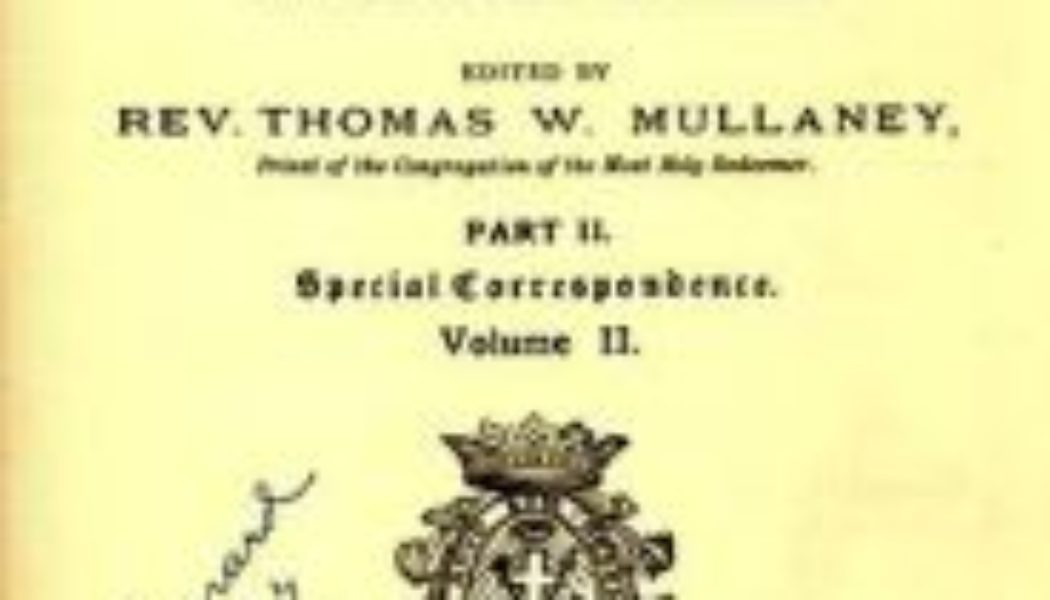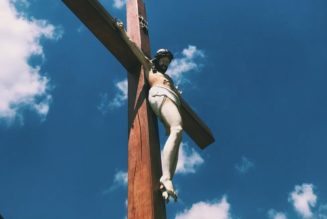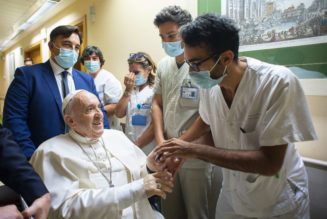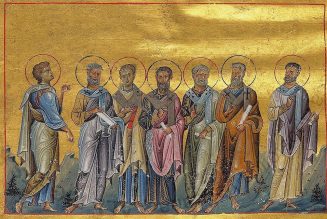Don’t be put off by the wall of text!
Take some time, scroll down, poke around. I’m offering you all the words with the hope that you can see – as is my constant mission – how the past can illuminate the present.
Belonging to a rich noble family of Naples, Alfonso Maria de’ Liguori [known in English as Alphonsus Liguori] was born in 1696. Endowed with outstanding intellectual qualities, when he was only 16 years old he obtained a degree in civil and canon law. He was the most brilliant lawyer in the tribunal of Naples: for eight years he won all the cases he defended. However, in his soul thirsting for God and desirous of perfection, the Lord led Alphonsus to understand that he was calling him to a different vocation. In fact, in 1723, indignant at the corruption and injustice that was ruining the legal milieu, he abandoned his profession — and with it riches and success — and decided to become a priest despite the opposition of his father.
He had excellent teachers who introduced him to the study of Sacred Scripture, of the Church history and of mysticism. He acquired a vast theological culture which he put to good use when, after a few years, he embarked on his work as a writer.
He was ordained a priest in 1726 and, for the exercise of his ministry entered the diocesan Congregation of Apostolic Missions. Alphonsus began an activity of evangelization and catechesis among the humblest classes of Neapolitan society, to whom he liked preaching, and whom he instructed in the basic truths of the faith. Many of these people, poor and modest, to whom he addressed himself, were very often prone to vice and involved in crime. He patiently taught them to pray, encouraging them to improve their way of life.
Alphonsus obtained excellent results: in the most wretched districts of the city there were an increasing number of groups that would meet in the evenings in private houses and workshops to pray and meditate on the word of God, under the guidance of several catechists trained by Alphonsus and by other priests, who regularly visited these groups of the faithful. When at the wish of the Archbishop of Naples, these meetings were held in the chapels of the city, they came to be known as “evening chapels”. They were a true and proper source of moral education, of social improvement and of reciprocal help among the poor: thefts, duels, prostitution ended by almost disappearing.
Even though the social and religious context of the time of St Alphonsus was very different from our own, the “evening chapels” appear as a model of missionary action from which we may draw inspiration today too, for a “new evangelization”, particularly of the poorest people, and for building a more just, fraternal and supportive coexistence. Priests were entrusted with a task of spiritual ministry, while well-trained lay people could be effective Christian animators, an authentic Gospel leaven in the midst of society.
Another talk on the saint from B16.
Next some insights from his letters. You can find his writings all over the place, but for some old-school reading time, head to archive.org. His letters are particularly interesting. I always like reading the letters and journals of saintly figures. They tend to be a little more revelatory than carefully written, re-written and edited works made for public consumption, approved by authorities.
What I’m hoping that you might see through a bit of poking around in these readings is the value – as Adam DeVille has pointed out – of being familiar with history. It teaches us many things, but I think in this present moment, two points in particular, both reflecting the theme “nothing new under the sun.”
- The Church has always been a messy place in a messy world, full of human beings who are, at best, weak reflections of the faith they (we) claim to profess.
- The Church, in obedience to Christ, has always reached out to the “peripheries” and margins, has always offered the mercy of Christ as the core of its mission. Always. This is nothing that was just discovered in 2013. Really.
So three areas of interest from the letters: missions/preaching, liturgy and, yes…publishing.
I was interested in two lengthy letters – almost pamphlet-length, really – one about preaching and the  other about the usefulness of missions. (Remember Alphonsus Liguori founded the Redemptorists, an order originally dedicated to the preaching of parish missions.)
other about the usefulness of missions. (Remember Alphonsus Liguori founded the Redemptorists, an order originally dedicated to the preaching of parish missions.)
The letter on preaching begins on page 359, and might be of interest to..preachers, of course. He is making the case for simplicity and directness of language in preaching, in opposition to those who would preach in flowery, self-indulgent or abstruse ways.
I was really interested in his letter to a bishop about the preaching of missions. The bishop was supportive of missions being preached in his diocese, but had apparently written to St. Alphonsus seeking answers to the objections that others had voiced. It begins on page 404.
A modern reader (like me) might read this as a reflection on evangelization, period.
But, it will be asked, are there not over the poor in the villages pastors who preach every Sunday? Yes, there are pastors who preach ; but we must consider that all pastors do not, or cannot break the bread of the divine word to the illiterate in the manner prescribed by the Council of Trent. ” They shall feed the people committed to them with whole some words, according to their own capacity, and that of their people, by teaching them the things which it is necessary for all to know unto salvation, and by announcing to them, with briefness and plainness of discourse, the vices which they must avoid, and the virtues which they must practise.”
2 Hence it often happens that the people draw but little fruit from the sermon of the pastor, either because he has but little talent for preaching, or because his style is too high or his discourse too long. Besides, many of those who stand in the greatest need of instruction do not go to the sermon of the parish priest. Moreover, Jesus Christ tells us that No prophet is accepted in his own country And when the people always hear the same voice, the sermon makes but little impression upon them.
But the sermons of the missionaries who devote their lives to the missions are well arranged, and are all adapted to the capacity of the ignorant as well as of the learned. In their sermons, as well as in their instructions, the word of God is broken. Hence, in the mission, the poor are made to understand the mysteries of faith and the precepts of the Decalogue, the manner of receiving the sacraments with fruit, and the means of persevering in the grace of God : they are inflamed with fervor, and are excited to correspond with the divine love, and to attend to the affair of salvation.
Hence we see such a concourse of the people at the missions, where they hear strange voices and simple and popular discourses.
Besides, in the missions, the eternal truths which are best calculated to move the heart, such as the importance of salvation, the malice of sin, death, judgment, hell, eternity, etc., are proposed in a connected manner, so that it would be a greater wonder that a dissolute sinner should persevere in his wickedness, than that he should be converted. Hence, in the missions, many sinners give up their evil habits, remove proximate occasions of sin, restore ill-gotten goods, and repair injuries. Many radically extirpate all sentiments of hatred, and forgive their enemies from their hearts; and many who had not approached the sacraments for years, or who received them unworthily, make good confessions during the missions
His concern, over and over, is for the poor, the illiterate, particularly those in rural areas and villages.
Speaking of the missions given by the venerable priests of the Congregation of St. Vincent de Paul, the author of his Life says that, during a mission in the diocese of Palestrina in 1657, a young man whose arm had been cut off by an enemy, having met his enemy in a public street after a sermon, cast himself at his feet, asked pardon for the hatred he had borne him, and, rising up, embraced him with so much affection that all who were present wept through joy, and many, moved by his example, pardoned all the injuries that they had received from their enemies.
In the same diocese there were two widows who had been earnestly entreated but constantly refused to pardon certain persons who had killed their husbands. During the mission they were perfectly reconciled with the murderers, in spite of the remonstrance of a certain person who endeavored to persuade them to the contrary, saying that the murders were but recent, and that the blood of their husbands was still warm.
The following fact is still more wonderful: In a certain town, which I shall not mention,* vindictiveness prevailed to such an extent that parents taught their children how to take revenge for every offence, however small : this vice was so deeply rooted that it appeared impossible to persuade the people to pardon injuries. The people came to the exercises of the mission with sword and musket, and many with other weapons. For some time the sermons did not produce a single reconciliation; but on a certain day, the preacher, through a divine inspiration, presented the crucifix to the audience, saying: ” Now let every one who hears malice to his enemies come and show that for the love of his Saviour he wishes to pardon them : let him embrace them in Jesus Christ.” After these words a parish priest whose nephew had been lately killed came up to the preacher and kissed the crucifix, and calling the murderer, who was present, embraced him cordially.
By this example and by the words of the preacher the people were so much moved that for an hour and a half they were employed in the church in making peace with their enemies and embracing those whom they had before hated. The hour being late, they continued to do the same on the following day, so that parents pardoned the murder of their children, wives of their husbands, and children of their fathers and brothers. These reconciliations were made with so many tears and so much consolation that the inhabitants long continued to bless God for the signal favor bestowed on the town. It is also related that many notorious robbers and assassins, being moved by the sermon, or by what they heard from others of it, gave up their arms and began to lead a Christian life. Nearly forty of these public malefactors were converted in a single mission.
I have said enough ; I only entreat your Lordship to continue with your wonted zeal to procure every three years a mission for every village in your diocese. Do not attend to the objections of those who speak against the missions through interested motives or through ignorance of the great advantages of the missions. I also pray you to oblige the pastors and priests of the villages to continue the exercises recommended to them by the missionaries, such as common mental prayer in the church, visit to the Blessed Sacrament, familiar sermons every week, the Rosary, and other similiar devotions. For it frequently happens that, through the neglect of the priests of the place, the greater part of the fruit produced by the mission is lost. I recommend myself to your prayers and remain,
From this section, I could only conclude…my. That’s a lot of violence happening….
Creativity. Zeal. Compassion. Inclusivity. Reaching to the margins and the peripheries. Mercy.
Now, to liturgy:
This is from letter 345, to the clergy of Frasso, after a visitation:
In the first place, we learn with deep sorrow, that there is not in the collegiate church of this place the proper distribution of the Masses on Sundays and feasts of obligation, as also on days of devotion when there is usually a great concourse of people. All the Masses, we are informed, are said, so to speak, at once, and in the early hours of the morning. In consequence, the people have, no opportunity of hearing Mass in the later hours, and particularly during summer when not only the choral service, but every other ecclesiastical function, also, is over at eight o clock.
We, therefore, ordain that, on all those days, Sundays and festivals, the Masses shall be celebrated two at a time and not more, and for this purpose the chief sacristan shall see that on those days only two chalices and two sets of vestments are prepared for the Masses. Moreover, the members of the collegiate body shall go to the choir on those days one hour later than usual, so that all the people who wish may be able to go to confession ; for experience teaches that the confessors, as well as the rest, leave the church after the Office is finished, even though they are wanted in the confessionals.
So basically, what it seems was going on was that all the Masses and confessions got it all done and over with super early so they could get out of there.
From 346:
As there is nothing which so effectually hinders the reformation of manners and the correction of abuses that have been introduced among the people, as the bad example of the clergy, “whose manner of living,” says the Council of Sardis, ” being exposed to the eyes of all, be comes the model of either good or wicked lives”, we take very much to heart the gravity of the obligation incumbent upon us of removing from our clergy and keeping at a distance from them, as far as lies in our power, whatever might be an occasion of scandal or bad example to the faithful. We are, likewise, solicitous that we should not have to render an account to Almighty God for the offences of ecclesiastics connived at or uncorrected by us.
Considering, therefore, the innumerable evils and sins that arise from certain classes of games, which have been prohibited with good reason by the sacred canons, we desire to apply a prompt and efficacious remedy to these abuses. Accordingly, we forbid all the ecclesiastics of this our city and diocese, under pain of suspension a divinis, reserved to ourselves, and to be incurred ipso facto, and other punishment at our discretion, to play at any game of chance whatever, be it with cards or dice, and in particular, basset, primero, Ouanto inviti, paraspinto, or by whatever names such games may be called. At the same time, we warn all that we shall be most diligent in pursuing those who dis obey this ordinance, and unrelenting in punishing them with necessary severity.
We desire, therefore, that the present regulation be made public and put up in the usual places, so that no one may be able to excuse himself on the plea of ignorance.
From letter 334 – this admonition that saying Mass in less than fifteen minutes is…a problem… reoccurs many times in the letters.
Everyone knows the great reverence which the holy sacrifice of the Mass demands. We, therefore, earnestly recommend to our priests attention in celebrating- this august sacrifice with all the ceremonies prescribed by the rubrics, and with the gravity befitting this sublime mystery, as well on account of the reverence due to God, as for the edification that may thence derive to the faithful. It was to secure this end that the Council of Trent imposed upon bishops the express obligation of preventing by every means all irreverence in the celebration of this sacred function ; irreverence which can scarcely be distinguished from impiety,….
Now , as grave irreverence must be understood any notable omission of the ceremonies prescribed in the missal, which in so far as they pertain to the celebration of holy Mass, are of precept, also the saying of Mass in a hurried manner. The common opinion of theologians is, that he is guilty of grievous sin who says Mass in less than a quarter of an hour; because to celebrate with becoming reverence not only must the prayers of the missal be pronounced distinctly, and the prescribed rubrics duly observed, but all this must be done with that gravity which is befitting, a thing that cannot be done in less than a quarter of an hour, even in Masses of requiem or in the votive Mass of the Blessed Virgin.
This is really interesting to me, and is an admonition that occurs regularly in the letters. From 343
To afford perfect freedom of conscience, pastors are exhorted to procure a strange confessor for their people once a month, and to abstain from hearing confessions themselves on those day
There’s a lot more, but I’ll end this post with this. As best I can work out, it’s a description of how to add instruction to the Mass, particularly for children. It seems to call for a reader to read aloud certain meditations at various points of the Mass. Take a look at letter 339 for the whole thing, and share your observations:
The subjects of these meditations shall be, for the most part, the eternal truths and sin. On Fridays, however, the Passion of Jesus Christ, and on Saturdays, the Sorrows of the Blessed Virgin, shall form the topics of the medita ion. The children shall be taught to keep their eyes cast down, or to cover them with their hands, so as to pay attention to what has been read. The second point of the meditation shall be read after the Sanctus.
2. As soon as the reading of the first point is finished, the Mass shall begin. At the Offertory the reader shall say: ” Let us make an act of love: O my God, how good Thou art ! I wish to love Thee as much as all the saints love Thee ; as much as Thy dear Mother Mary loves Thee. But if I cannot love Thee so much, my God, my all, my only good, because Thou art worthy of all our love, I love Thee above all things, I love Thee with my whole heart, with my whole soul, with all my mind, with all my strength. I love Thee more than myself, and could I do so, I would make Thee known and loved by all men even at the price of my blood.” During the meditation, one or the other priest who is present may go around suggesting some brief reflections on what has been read.
3. After the Sanctus, the second point shall be read. It shall be on the same subject as the first, and read in the same manner.
4. After the elevation of the chalice, the reader shall say: “Let us make an act of love to Jesus in the Blessed Sacrament, and also an act of contrition : My Jesus, who for love of me art present in this Sacrament, I thank Thee for so great love, and I love Thee with my whole heart. Eternal Father, for the love of Mary, for the love of Thy dear Son Jesus dead upon the cross, and present in this Sacrament for love of us, pardon me all my sins, and all the displeasure I have caused Thee. I am heartily sorry for them, O my God, because I love Thee with my whole heart.”
5. After the Pater noster, the reader shall say: “Let us renew our resolution of never more offending Jesus Christ My Jesus, with the help of Thy grace, I desire to die rather than offend Thee again. As the fruit of this me ditation, let us make some particular resolution that will give pleasure to Jesus Christ, especially to rid ourselves of the fault we most frequently commit.” After a brief pause : ” Let us ask Almighty God for the love of Jesus Christ to give us the grace to fulfil the promise we have made.”
6. When the celebrant has said Domine non sum dignus or after the Communion of the people, if there are any com municants, the reader shall say: “Let us have recourse to the Blessed Virgin Mary, and ask her for some special grace: O Mary, my hope, I love thee with my whole heart. I would wish to die for thy love. My dearest Mother, take me under thy mantle, and there let me live and die. For the love of Jesus Christ, my dear Lady, obtain for me the grace which I now ask of thee.” Here each one shall ask of Mary with the utmost confidence the grace desired. After Mass, all shall recite the Hail, holy Queen, with the proper pauses, and add the prayer “Grant, we beseech Thee, O Lord”.
And while the content of what follows might bore some seeking out more elevated conversations, I was delighted, for it involves correspondence from the saint to his publishers, as well as others with an interest in the books he was writing and publishing.
There’s some theological material, as he explains why he is deleting this or that portion of a manuscript, but it’s mostly (so far) totally prosaic, and focused on practical matters of communication, orders and pricing.
The letters reflect quite a bit on his concern to get this books out there to people who will read them – Naples is always out of copies, but that’s one of the few places he has an interested audience, and the priests, well….
I am glad that the History of the Heresies is finished. Once more, I remind you not to send me any copies for sale, as the priests of my diocese are not eager for such books; indeed, they have very little love for any reading whatsoever.
Besides, I am a poor cripple, who am Hearing my grave, and I do not know what I should do with these copies.
Rest assured, that I regard all your interests as though they were my own. If I could only visit Naples, I might be able to do something personally. But confined here in this poverty-stricken Arienzo, I write letters innumerable to people in Naples about the sale, but with very little result. I am much afflicted at this, but affliction seems to be all that I am to reap from these negotiations.
So, writers….you’re not alone!
Join Our Telegram Group : Salvation & Prosperity








